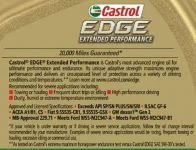Castrol Edge extended Performance 0w-20
CASTROL EDGE EXTENDED PERFORMANCE 0W-20
API SP/SN PLUS/SN
ILSAC GF-6
ACEA A1/B1, ACEA C5
Meets Ford WSS-M2C947-B1
Meets Ford WSS-M2C962-A1
Fiat 9.55535-CR1, Fiat 9.55535-GSX
MB 229.71
GM dexos1® Gen 2
Looks like at this point that the API and Euro (ACEA) have pretty much overlapped. Here is a C5 that is also a Dexos1.
CASTROL EDGE EXTENDED PERFORMANCE 0W-20
MEETS OR EXCEEDS INDUSTRY STANDARDS:
API SP/SN PLUS/SN
ILSAC GF-6
ACEA A1/B1, ACEA C5
Meets Ford WSS-M2C947-B1
Meets Ford WSS-M2C962-A1
Fiat 9.55535-CR1, Fiat 9.55535-GSX
MB 229.71
GM dexos1® Gen 2
Looks like at this point that the API and Euro (ACEA) have pretty much overlapped. Here is a C5 that is also a Dexos1.


